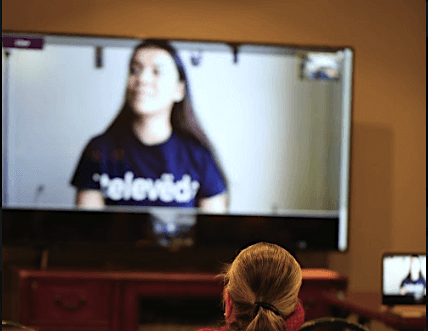
Even before today’s social distancing policies and shutdowns, internet and technology usage has soared in the senior demographic. In America, almost 75% of older adults are using the internet, and more than half own a smartphone. Technology is increasing the ability for the elderly to “age in place” by providing immediate access to family, health providers, and home services.
Technology provides unique opportunities and has the potential to make seniors’ lives exponentially easier. However, it also poses security risks, which is why it’s important to understand how to keep seniors safe while being online. If you work with older populations, you have to know the various aspects of internet safety for older adults.
Why We Need to Protect Seniors Online
Live streaming technology in particular has been expanding rapidly. Zoom, Google Meets, Facetiming, House Party, and Facebook are just a few options for individuals to virtually interact–a greater need since social distancing policies and shut downs. But with these capabilities, several of the platforms have been struggling with security flaws.
Zoom is one of the most popular video-conferencing applications, but despite its growth it’s been facing inquiries over their security practices. The program has recently been banned from several organizations and schools due to privacy issues, “Zoom bombing,” and webcam hijacking.
Anyone with a Zoom meeting link can “Zoombomb” attendees, meaning they can interrupt a class and broadcast inappropriate content. Online intruders also may be able to hijack users’ webcams, and stream content from their computer. Zoom’s app has also been sharing its data with third parties (like Facebook), which is another breach in security, especially since they’ve been overstating their privacy standards.
As a live streaming service, televëda understands the importance of convenience, efficiency, and low expenses for providing virtual experiences, but security is one of the most important issues of all. Security problems can make or break your virtual community experience, especially when working with vulnerable populations.
Seniors are one of the most vulnerable groups for online scams, which is why online activities need to be monitored extremely carefully to avoid any potential issues. Even one bad experience could keep seniors from ever participating again, and can cause a loss of face for your service or community.
How to Keep Seniors Safe on the Internet
You need to ensure that whatever service you’re providing has ample security measures. If you’re not using your own streaming technology, note that this doesn’t necessarily mean the tools themselves, but the processes implemented while using them.
Link Sharing
Want to avoid Zoom-bombing? Then it’s time to think about how you’re sharing access to your content. Will you have private sessions or publicly-accessible open sessions? The latter is common right now, but that can make your live streaming session vulnerable to trolls and hijackers.
If you have a private group, then you have to consider how you are implementing that privacy. Password-protected online accounts are an option, but often reduce the number of participants and can add another level for management. Email authentication is another common form, but again, user adoption in the senior demographic may drop significantly because of username and password requirements. “Frustration with technology” is one of the main factors keeping seniors from trying certain services, so it’s important to find a balance between safety and being user-friendly.
Using cookies may be a good option for that balance. By remembering specific users for a determined amount of time, they only require a single log in. So even if the initial process takes time and effort, it can provide a needed layer security.
Even after you take these precautions, you still have to put a plan in place if someone does end up interrupting your stream. If you’re using Zoom or another streaming provider, make sure you know the process of removing unwanted participants, and how to keep them out in the first place.
Video Conferencing Tools
It’s not just the trolls that join your camera or disrupt the session through broadcasting. Other vulnerabilities include the chatting tools on these services, where hackers can send inappropriate messages, dangerous links, or engage with senior users in attempts to extract personal or financial information. To combat this, disable public-facing chats on whatever service you are using. Messages can be sent only to the host, or require host approval of public messages.
Another risky aspect is screen-sharing tools. Do your seniors have to give camera and microphone access to participate? Do they know when their camera and microphone are on, and how to turn them off if needed? If a user doesn’t know how to use screen sharing, it can potentially lead to embarrassment for the host and the users, so make sure to review all of these procedures with participants.
Software Policy Reviews
When using a new service, make sure the software advertising policies are carefully reviewed. The size and capability of Facebook, for example, makes it an awesome resource for live streaming content, but their primary source of revenue is advertising. Facebook doesn’t necessarily have the best track record of maintaining user privacy, and the reach of this platform also leaves it vulnerable to attempts in online scamming.
Therefore, depending on what platform you use, have someone on your team read the fine print that relates to the use of advertising for free products and services. Since most senior citizen’s online systems are without malware, be vigilant to what your users are agreeing to.
Online Security is Key in Technology Usage by Older Adults
Technology has unlimited potential, but with that there can also be various risks. By reviewing and understanding internet safety for older adults, you can guide and protect the elderly when they’re online. Have more security questions?
Need some help with this technology? Reach out to us here, or at [email protected].